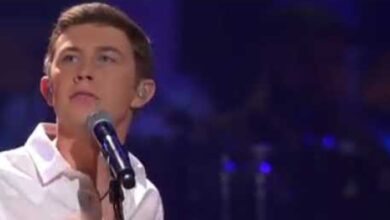Kelly Clarkson’s Rendition Of ‘The Dance’ Moved Garth Brooks To Tears
During the 43rd Kennedy Center Honors, held on June 6, 2021, a memorable and deeply emotional atmosphere permeated the venue as Kelly Clarkson took the stage to perform “The Dance,” a beloved classic by Garth Brooks. This ceremony was particularly significant, honoring not only Brooks but also other luminaries in the arts, including choreographer and actress Debbie Allen, folk icon Joan Baez, beloved entertainer Dick Van Dyke, and celebrated violinist Midori. Hosted by Gloria Estefan, the evening featured a myriad of performances by a variety of artists, each paying tribute to the honorees in unique and heartfelt ways. The combination of talent represented that night reflected the diverse landscape of artistic expression in America.
Clarkson’s rendition of “The Dance” was a highlight of the night, standing out for its emotional depth and sincerity. Originally released in 1989 as part of Brooks’ self-titled debut album, “The Dance” has resonated with listeners over the decades due to its poignant themes of love, loss, and the bittersweet nature of life. Clarkson, known for her powerful vocal ability and expressive performance style, brought her own life experiences into her interpretation of the song. With an understated piano accompaniment, her voice soared through the lyrics, inviting the audience into a personal reflection on both the artist’s journey and the universal themes encapsulated in the song.
Garth Brooks, an iconic figure in the country music genre, was visibly touched by Clarkson’s performance. As he sat in the audience, emotions washed over him, and he struggled to hold back tears. This moment underscored the profound connection that exists between artists and their work, as well as the impact that a moving performance can have on those who created the original pieces. Clarkson’s ability to honor Brooks’ legacy while still infusing the song with her own emotional resonance revealed the timeless nature of great music and the way it can transcend different artists’ interpretations.
For Clarkson, “The Dance” has personal significance as well. She has been candid about the impact the song had on her during her own struggles, particularly in the wake of her divorce from Brandon Blackstock. The lyrics and themes of acceptance and reflection resonated with Clarkson, often influencing her songwriting and creative process. The poignant backdrop of the Kennedy Center Honors added a deeper layer to her performance, as it became not just a tribute to Brooks, but also a heartfelt expression of her own emotional journey.
Born on April 24, 1982, in Fort Worth, Texas, Kelly Clarkson gained fame after winning the first season of “American Idol” in 2002. This victory launched her into a successful career that has spanned multiple genres, showcasing her versatility as an artist. Clarkson’s discography includes a multitude of hit singles, with standout tracks like “Since U Been Gone,” “Stronger (What Doesn’t Kill You),” and “Piece by Piece,” demonstrating her vocal prowess and songwriting skills. Over the years, she has been awarded numerous accolades, including multiple Grammy Awards and American Music Awards, a testament to her impact and contribution to the music industry.
In addition to her musical career, Clarkson has made significant strides as a television personality. She hosts “The Kelly Clarkson Show,” where she blends music, interviews, and segments that showcase her charm and wit. Her presence as a coach on NBC’s “The Voice” further highlights her influence in the entertainment realm, as she guides aspiring artists while providing insight from her extensive experience in the industry. Clarkson’s ability to connect with audiences—both in live performances and through television—cements her status as a beloved figure.
The performance during the Kennedy Center Honors encapsulated Clarkson’s ability to evoke emotion through her artistry, reinforcing her position as a significant contemporary musician. By offering a fresh yet deeply respectful interpretation of Brooks’ work, she bridged the gap between past and present, showcasing the enduring power of his music while honoring its legacy. The evening itself was a celebration not only of Garth Brooks’ contributions to country music but also of the ongoing influence that artists like Clarkson have on future generations.
The reception of Clarkson’s performance during the Kennedy Center Honors was overwhelmingly positive, resonating with both the live audience and viewers tuning in from home. It was a moving reminder of the timelessness of great songwriting and the capacity of artists to translate that into something new and meaningful. Clarkson’s ability to communicate such deep emotions through her music exemplifies the strength of storytelling in song, a tradition deeply rooted in both country music and broader musical genres.
This particular performance remains a significant moment in the history of the Kennedy Center Honors, highlighting the emotional connectivity that great music brings to audiences through the interpretations of talented artists. Indirectly, it also speaks to the legacy of Garth Brooks, as his timeless ballad found new life through Clarkson’s artistry. The moment captured the essence of why such honors exist—to celebrate creativity, emotional expression, and the powerful sharing of experiences through music. As such, it serves as a reminder of the special role that music plays in our lives, carrying with it the weight of memories, emotions, and a shared human experience.
?





